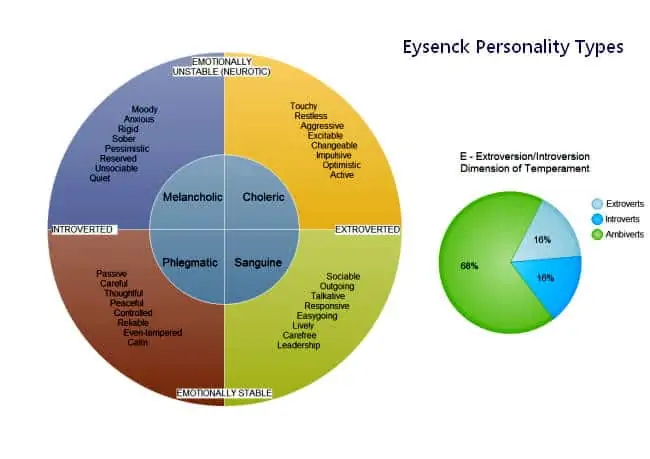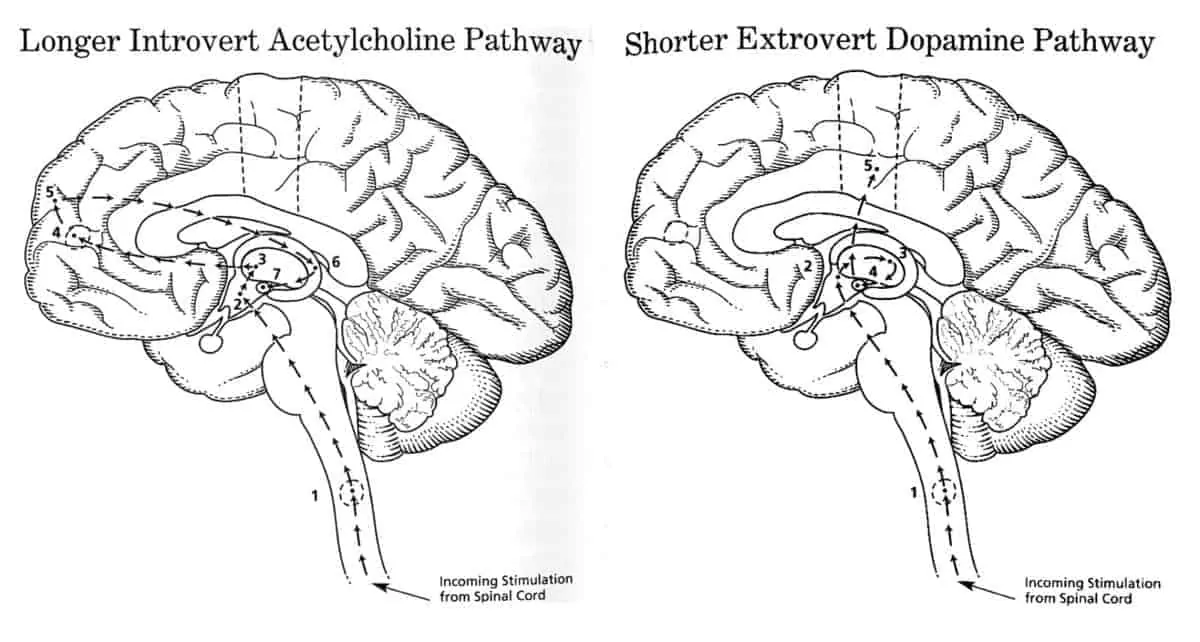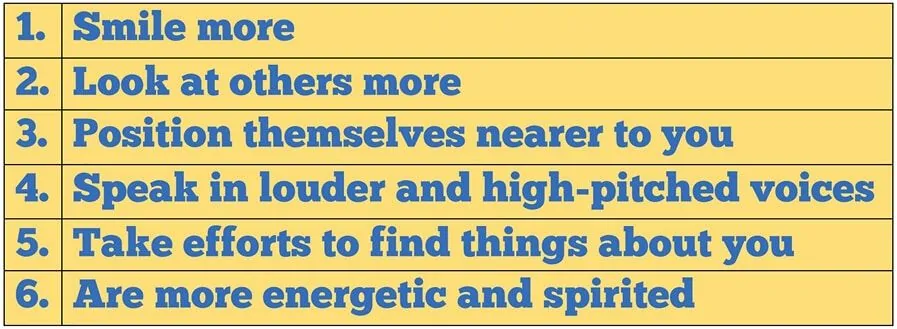Today's Thursday • 8 mins read
— By Dr. Sandip Roy.
You and your friends probably think extroverts are happier people. They have more fun, are more fun to be with, and have many happy friends. They are also better at expressing their joy.
Does science agree with that? Yes, personality psychologists do agree that extroverts are happier people than introverts.
They also seem to have figured out why it is so.
Read on to find out.
Takeaways:
- Extroverts seem to enjoy fun activities much more than introverts, as per studies.
- Acting like an extrovert can improve well-being, even among introverts, think some researchers.
- Extroverts have a more responsive “dopamine-driven pleasure system” that makes them seek out social interactions and new experiences.
Did you know that experts say “Extravert” while the rest of the world says “Extrovert”?

7 Reasons Why Extroverts Are Happier Than Introverts
Research in personality research consistently shows extroverts are generally happier than introverts, and this effect stretches over several decades into their lives.
1. Extroverts Are More Influenced By Rewards
- The idea that extroverts respond more positively to rewards was first proposed by psychologist Jeffrey Gray in 1982.
- Later, in 1991, researchers Larsen & Ketelaar found that extroverts react more strongly to positive experiences.
A key player in the extrovert-happiness game is dopamine, a neurotransmitter in our brain.
Dopamine is a “reward chemical” as it gets released as a reward for doing things we enjoy, like hanging out with our friends, exercising, or scrolling social media. The pleasure of this reward signals the brain to repeat those behaviors, so we doomscroll even when it’s time to go to sleep.
Dopamine induces both introverts and extroverts to get more talkative and more eager to take chances. But it does so more strongly in the extroverts.
Because extroverts have a more active dopamine reward pathway. This extra activity makes them happier than introverts in similar situations. For example, a chocolate bar can bring more joy to an extrovert than an introvert, and it can do so much faster.
2. Extroverts Do More of Socially Enjoyable Things
According to Gray’s theory, extroverts tend to engage more in socially enjoyable activities, which adds to their overall happiness.
They are more likely to attend parties, clubs, dances, and social gatherings than introverts. An active social life allows for more opportunities to connect with others, and experience joy and excitement more often.
The more they engage in fun activities, the more positive experiences they accumulate, which reinforces their happiness.
3. Extroverts Are Masters of Mood Regulation
Extroverts excel at regulating their moods.
Psychologists suggest that they have a greater ability to control their emotional states.
- Extroverts can quickly shift into lighter moods and maintain that positivity for longer periods.
- Extroverts often bounce back more quickly from sadness or frustration as compared to others.
This mood management skill helps them handle life’s ups and downs with resilience, another reason for their overall happiness.
4. Extroverts Get It From Their Parents
Your extroverted behaviors may have come from your extroverted parents.
A landmark study by Lykken and Tellegen in 1996, which involved 1,400 twins, found that extroversion has a genetic component. This genetic influence can shape one’s social tendencies and behaviors.
As a result, people with extroverted parents may naturally gravitate to social interactions and activities that extroverts enjoy, which then helps them be happier.
5. Extroverts Store Stacks of ‘Golden Memories’
Extroverts remember their past in a far more positive light than others. They are collectors of “golden” memories.
In 2011, Ryan Howell found that “highly extroverted people are happier with their lives because they tend to hold a positive, nostalgic view of the past and are less likely to have negative thoughts and regrets.”
While the extroverts hold on tightly to their pleasant memories, the neurotics keep a more negative and less positive view of their pasts.
6. Extroverts’ Memories Cause A Stronger Effect
Extroverts have a shorter dopamine-mediated brain stimulation pathway. Dopamine is our brain’s pleasure chemical. Dopamine is released whenever we receive a reward (such as food, sex, a promotion, approbation, or victory).
The brains of extroverts produce a stronger dopamine response to their memories of rewards, as found by Depue and Fu in 2013.
7. Extroverts From Different Cultures Express Differently
Extroverts have a cultural correlation — people from various cultures can have different levels of extroversion. In an interesting 1995 study, Lynn and Martin tried to establish cultural correlations to extroversion.
They found that India, Nigeria, and the USA scored very high on extroversion. Britain and Canada scored slightly lower. China was the lowest on this extroversion scale. And the Chinese are the least extroverted people.
That is, country-specific cultures have an influence over how extroverted you are.
Happiness of Extroverts, From Research
Six studies where psychologists found that extroverts are happier than introverts:
- Codependency of Extroversion & Happiness: Hans Eysenck’s Temperament Test found extroversion and happiness are closely linked, and are dependent on each other. He even suggested that extroversion could be an index of happiness.
- The Happiness Edge of Young Extroverts: In 1985, Headey found that young extroverted individuals are more likely to encounter positive experiences in their lives, such as falling in love. This tendency gives extroverts a distinct “happiness edge” over their more introverted counterparts.
- Correlations of Extroversion & Happiness: A study by Hills and Argyle in 2001 revealed strong correlations between happiness and extroversion, further supporting the idea that extroverted individuals tend to experience higher levels of happiness.
- More Extroversion-Happiness Links: The study “The Effect of Personality on Happiness,” which included 1500+ participants from various countries, found compelling evidence that happiness and extraversion are positively linked (Momeni & Kalali, 2010).
- Extroverts Laugh More: Willibald Ruch concluded in 1998 that extroverted personalities tend to laugh more frequently, highlighting their joyful nature.
- Long-Term Relationships Increase Extroversion: Ruch also discovered that long-term social relationships can enhance extroversion in individuals. These enduring connections are vital to our existence and contribute significantly to the joyful moments in our lives.

By the way, the extroverts are the ones to arrive at the party the earliest and leave the last. And they are the life and soul of the party.
In her passionate TED talk, introvert Susan Cain argues that introverts bring extraordinary talents and abilities to the world, and should be encouraged and celebrated.
Extroverts vs. Introverts
Brain scans suggest introverts and extroverts use different primary pathways for information processing.
- Extrovert brains mainly use the dopamine pathway for information processing. They also had links to adrenaline, energy-spending, and the sympathetic nervous system.
- Introvert brains mainly use the acetylcholine pathway for information processing. They also had links to energy-conserving and parasympathetic nervous system.
Now, the extrovert’s dopamine pathway is shorter and simpler, while the introvert’s acetylcholine pathway is longer and more winding. As a result, introverts often need more time to process the stimuli before they respond.

Introverts are highly observant and often catch what others are likely to miss, like the microexpressions on a friend’s face. Research shows they are also more likely to be riddled with anxiety.
How to spot an extrovert in a crowd?
The extroverts have a definite tell-tale pattern in their social behaviors. You can recognize them easily if you look for these 6 characteristics:
- Extroverts smile more.
- They look at others more.
- They place themselves nearer to you.
- Extroverts speak in loud and high-pitched voices.
- They make an effort to find out things about you.
- Extroverts are energetic and high-spirited.

Extroverts use words that relate to people and social processes. This study analyzed Facebook status updates from more than 66,000 users and reported that extroverts post statuses that are more likely to acknowledge the existence of other people, such as party, girls, tonight, amazing, love.
Thorne, in 1987, carried out an interesting experiment. He put two extroverts together and found they were soon trying to learn about each other by asking questions and paying compliments.
In a reverse experiment, when he put pairs of introverts together, they sat there in absolute silence.
Final Words
So, extroverts are happier than introverts. But, as we talk about extroverts and their perpetual state of happiness, you must realize that introverts are also happy in their own ways.
It’s just the type of happiness – the effusive, the declarative, and the socially exuberant type of happiness – that makes the extroverts score more in the studies by psychologists as well as in the minds of common people.
Happiness can also be found in serenity, equanimity, placidity, and tranquility.
√ Also Read: Why it’s so unhealthy to hold grudges?
√ Please share it with someone if you found this helpful.

